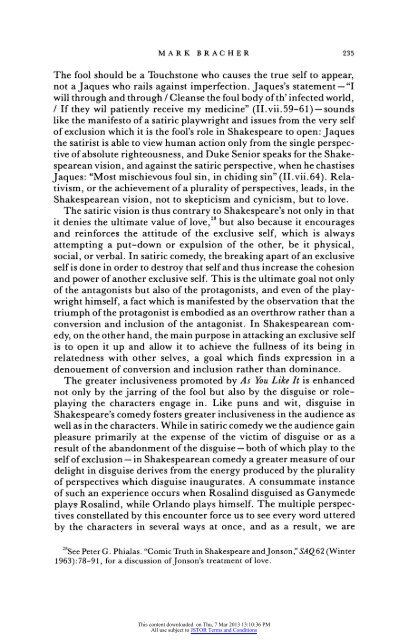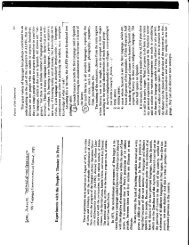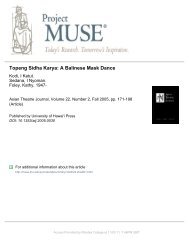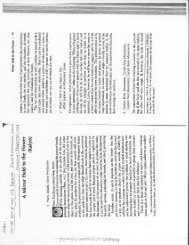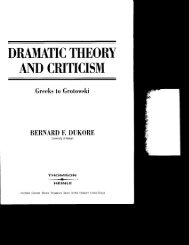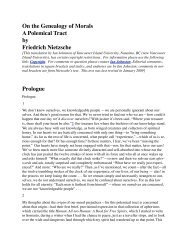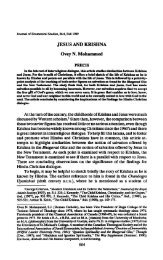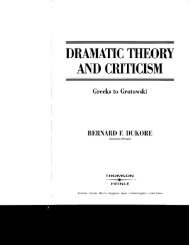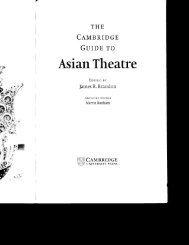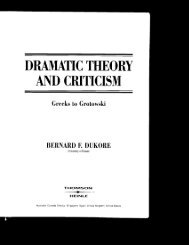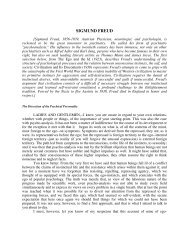Contrary Notions of Identity in As You like It - Yavanika
Contrary Notions of Identity in As You like It - Yavanika
Contrary Notions of Identity in As You like It - Yavanika
You also want an ePaper? Increase the reach of your titles
YUMPU automatically turns print PDFs into web optimized ePapers that Google loves.
MARK<br />
BRACG HER<br />
235<br />
The fool should be a Touchstone who causes the true self to appear,<br />
not a Jaques who rails aga<strong>in</strong>st imperfection. Jaques's statement - "I<br />
will through and through / Cleanse the foul body <strong>of</strong> th' <strong>in</strong>fected world,<br />
/ If they wil patiently receive my medic<strong>in</strong>e" (II.vii.59-61)-sounds<br />
<strong>like</strong> the manifesto <strong>of</strong> a satiric playwright and issues from the very self<br />
<strong>of</strong> exclusion which it is the fool's role <strong>in</strong> Shakespeare to open: Jaques<br />
the satirist is able to view human action only from the s<strong>in</strong>gle perspective<br />
<strong>of</strong> absolute righteousness, and Duke Senior speaks for the Shakespearean<br />
vision, and aga<strong>in</strong>st the satiric perspective, when he chastises<br />
Jaques: "Most mischievous foul s<strong>in</strong>, <strong>in</strong> chid<strong>in</strong>g s<strong>in</strong>" (II.vii.64). Relativism,<br />
or the achievement <strong>of</strong> a plurality <strong>of</strong> perspectives, leads, <strong>in</strong> the<br />
Shakespearean vision, not to skepticism and cynicism, but to love.<br />
The satiric vision is thus contrary to Shakespeare's not only <strong>in</strong> that<br />
it denies the ultimate value <strong>of</strong> love,28 but also because it encourages<br />
and re<strong>in</strong>forces the attitude <strong>of</strong> the exclusive self, which is always<br />
attempt<strong>in</strong>g a put-down or expulsion <strong>of</strong> the other, be it physical,<br />
social, or verbal. In satiric comedy, the break<strong>in</strong>g apart <strong>of</strong> an exclusive<br />
self is done <strong>in</strong> order to destroy that self and thus <strong>in</strong>crease the cohesion<br />
and power <strong>of</strong> another exclusive self. This is the ultimate goal not only<br />
<strong>of</strong> the antagonists but also <strong>of</strong> the protagonists, and even <strong>of</strong> the playwright<br />
himself, a fact which is manifested by the observation that the<br />
triumph <strong>of</strong> the protagonist is embodied as an overthrow rather than a<br />
conversion and <strong>in</strong>clusion <strong>of</strong> the antagonist. In Shakespearean comedy,<br />
on the other hand, the ma<strong>in</strong> purpose <strong>in</strong> attack<strong>in</strong>g an exclusive self<br />
is to open it up and allow it to achieve the fullness <strong>of</strong> its be<strong>in</strong>g <strong>in</strong><br />
relatedness with other selves, a goal which f<strong>in</strong>ds expression <strong>in</strong> a<br />
denouement <strong>of</strong> conversion and <strong>in</strong>clusion rather than dom<strong>in</strong>ance.<br />
The greater <strong>in</strong>clusiveness promoted by <strong>As</strong> <strong>You</strong> Like <strong>It</strong> is enhanced<br />
not only by the jarr<strong>in</strong>g <strong>of</strong> the fool but also by the disguise or roleplay<strong>in</strong>g<br />
the characters engage <strong>in</strong>. Like puns and wit, disguise <strong>in</strong><br />
Shakespeare's comedy fosters greater <strong>in</strong>clusiveness <strong>in</strong> the audience as<br />
well as <strong>in</strong> the characters. While <strong>in</strong> satiric comedy we the audience ga<strong>in</strong><br />
pleasure primarily at the expense <strong>of</strong> the victim <strong>of</strong> disguise or as a<br />
result <strong>of</strong> the abandonment <strong>of</strong> the disguise-both <strong>of</strong> which play to the<br />
self <strong>of</strong> exclusion - <strong>in</strong> Shakespearean comedy a greater measure <strong>of</strong> our<br />
delight <strong>in</strong> disguise derives from the energy produced by the plurality<br />
<strong>of</strong> perspectives which disguise <strong>in</strong>augurates. A consummate <strong>in</strong>stance<br />
<strong>of</strong> such an experience occurs when Rosal<strong>in</strong>d disguised as Ganymede<br />
plays1 Rosal<strong>in</strong>d, while Orlando plays himself. The multiple perspectives<br />
constellated by this encounter force us to see every word uttered<br />
by the characters <strong>in</strong> several ways at once, and as a result, we are<br />
28See Peter G. Phialas. "Comic Truth <strong>in</strong> Shakespeare andJonson," SAQ62 (W<strong>in</strong>ter<br />
1963):78-91, for a discussion <strong>of</strong>Jonson's treatment <strong>of</strong> love.<br />
This content downloaded on Thu, 7 Mar 2013 13:10:36 PM<br />
All use subject to JSTOR Terms and Conditions


